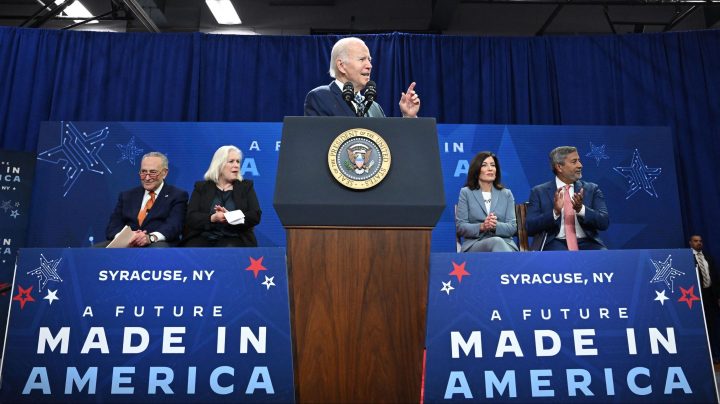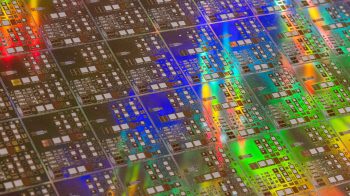
Chip manufacturing jobs are coming. Are Americans ready for them?
Chip manufacturing jobs are coming. Are Americans ready for them?

President Joe Biden spent some time in Syracuse on Thursday, where Micron Technology is planning to spend $100 billion over the next two decades as it builds semiconductor factories in the area. With the passage of the CHIPS Act this summer, that giant federal law investing billions of federal dollars in the chip industry, more of these factories are expected. Tens of thousands of jobs are expected to be created as well, and schools are rushing to create training so people can do them.
Those jobs are varied and include engineers, chemists and cleaners.
“It’s like a little city,” said Nina Turner, research director at IDC.
Part of that city: clean rooms, with people dressed in white uniforms, also known as bunny suits.
“Those people are often the technicians who are either monitoring the process or maintaining equipment or cleaning equipment,” Turner said.
The reason there are cleanrooms and bunny suits is that making chips involves etching precise patterns on wafers of silicon, and everything has to be just so.
“They have a whole gowning process and a decontamination process to make sure you are as clean as possible,” Turner said.
More than 60% of people who currently work in semiconductor manufacturing don’t have a college degree, according to the Commerce Department, and Turner says some entry-level technicians can start work with a high school diploma. But lots of jobs require additional training to advance, and in places like central Ohio, where Intel is planning to build two new factories, schools are working to offer it.
“We’re looking at things like VR and simulation, how can that play a role,” said Cheryl Hay with Columbus State Community College, which is updating its electronics engineering technician associate’s degrees to include training on how to be in a clean room, even if it doesn’t end up having one on campus.
Arizona State University in Phoenix is also offering different forms of training, including a certificate in semiconductor processing.
“There will never be a moment like the one we are experiencing right now,” said Kyle Squires, dean of the schools of engineering there. “This is genuinely once in a lifetime.”
Many of the expected jobs will be in places that haven’t traditionally been tech hubs, points out Anshel Sag with Moor Insights & Strategy.
“A lot of the semiconductor jobs that exist today are predominantly on the West Coast,” said Sag. “With the CHIPS Act, some of those jobs will actually come from Ohio and New York.”
Another requirement: People have to also want to work in manufacturing. Maria Flynn, who leads the nonprofit Jobs for the Future, said some worry these positions will be automated.
“I was hearing a lot from communities in Kentucky, for example, that parents were uneasy promoting manufacturing as a good pathway for their kids because they themselves had experienced layoffs,” Flynn said.
For those who want to try, the average salary in semiconductor production, according to the Commerce Department, is just under $100,000. Which might be worth putting on a bunny suit.
There’s a lot happening in the world. Through it all, Marketplace is here for you.
You rely on Marketplace to break down the world’s events and tell you how it affects you in a fact-based, approachable way. We rely on your financial support to keep making that possible.
Your donation today powers the independent journalism that you rely on. For just $5/month, you can help sustain Marketplace so we can keep reporting on the things that matter to you.

















